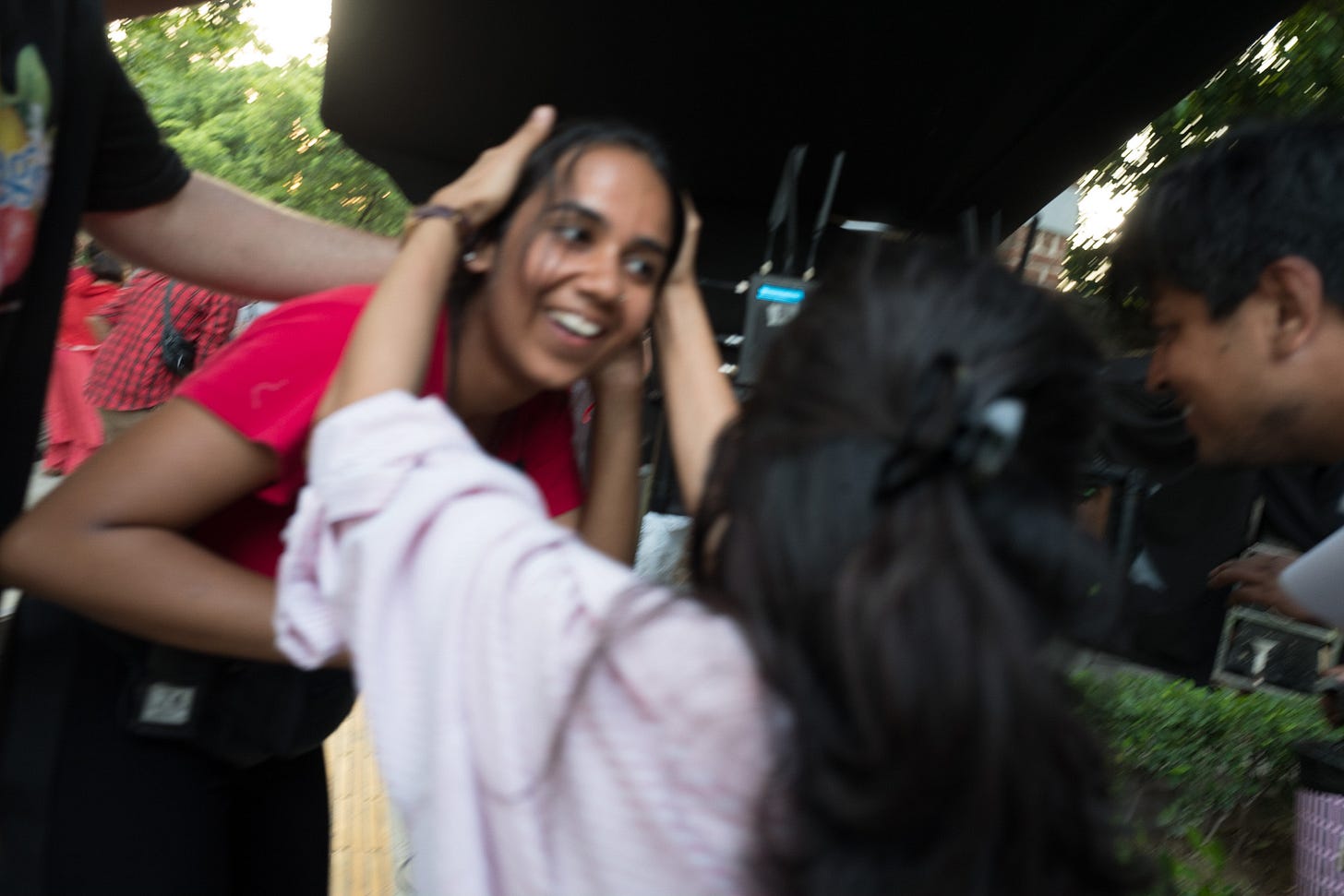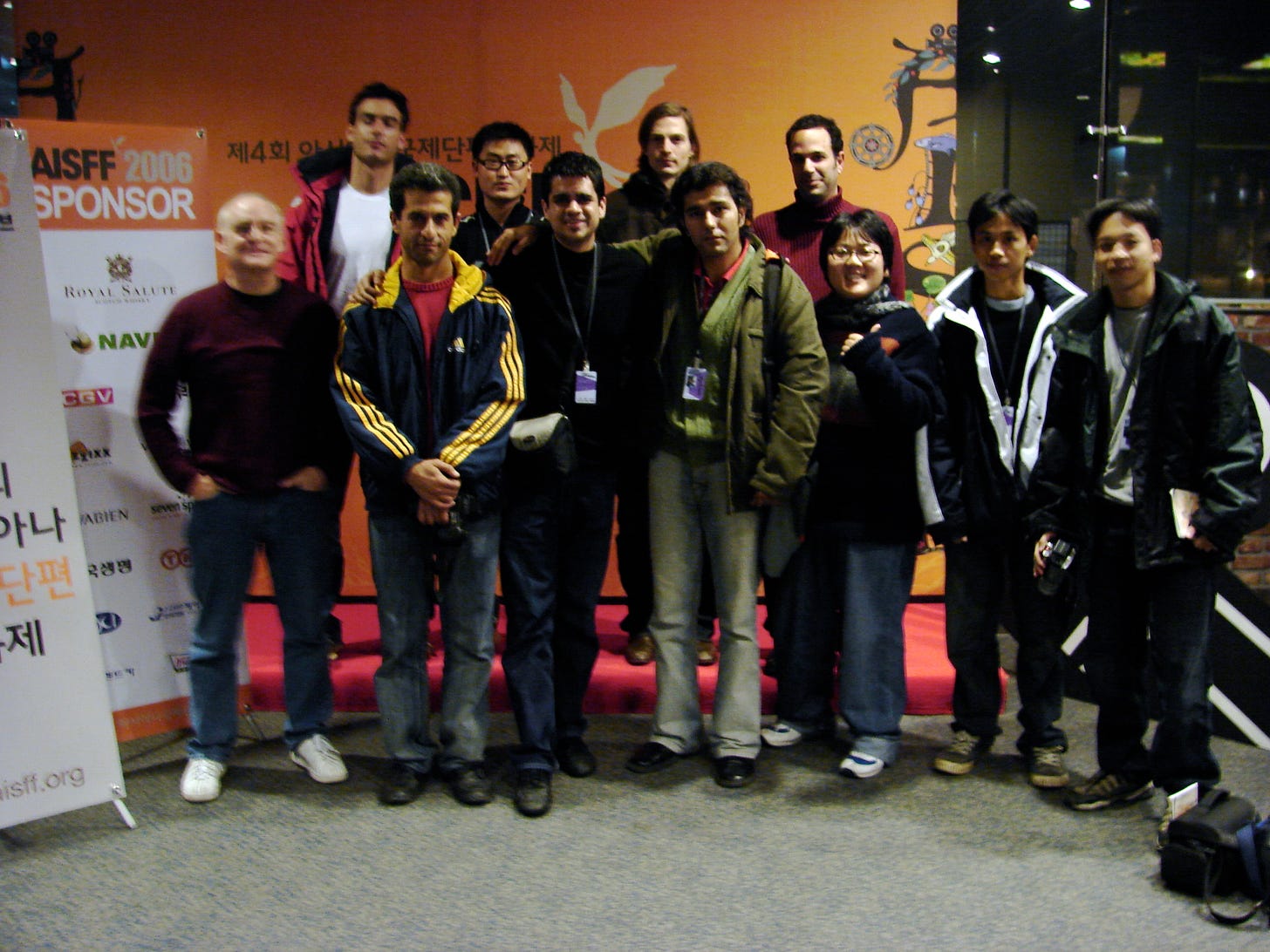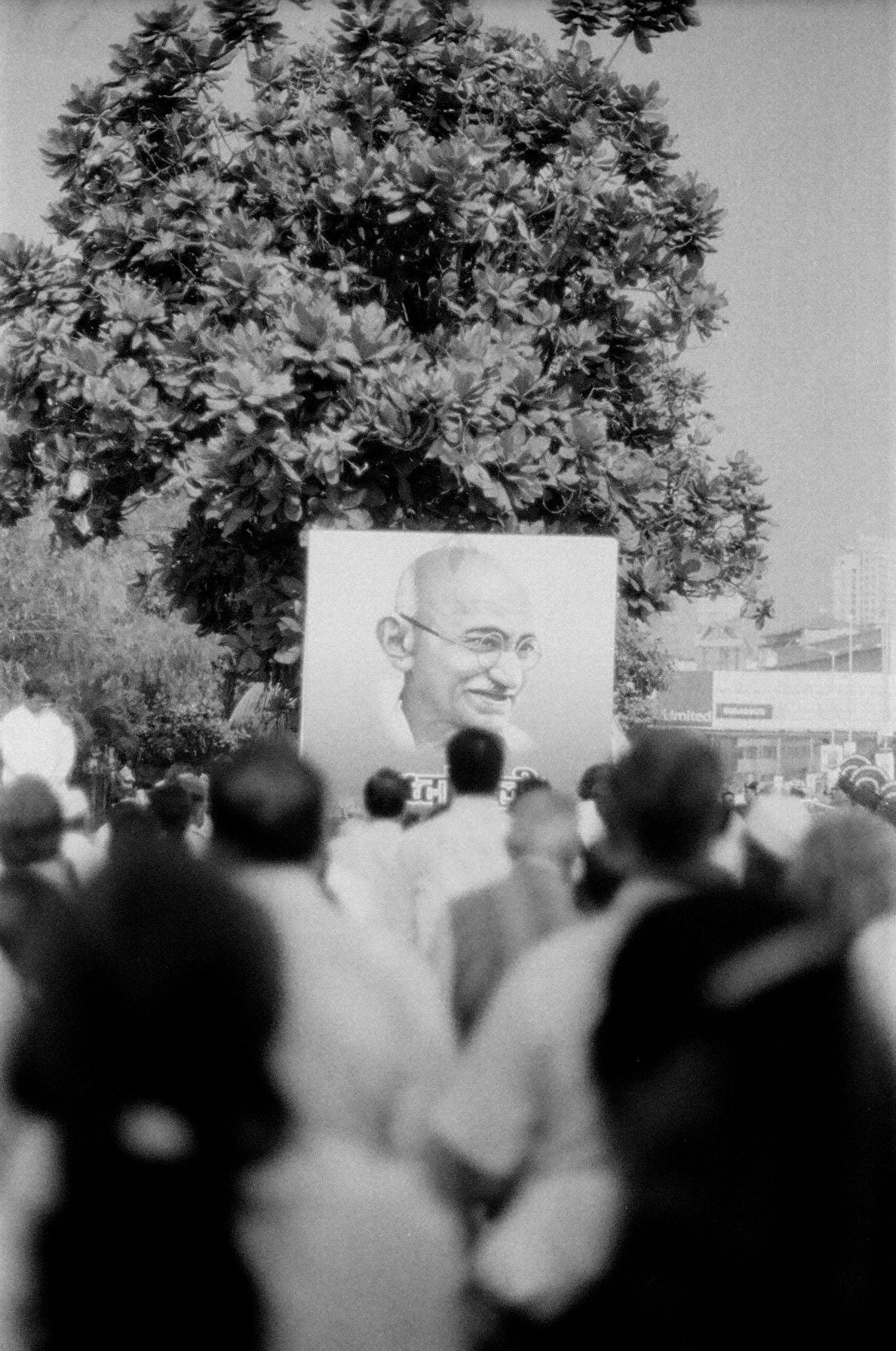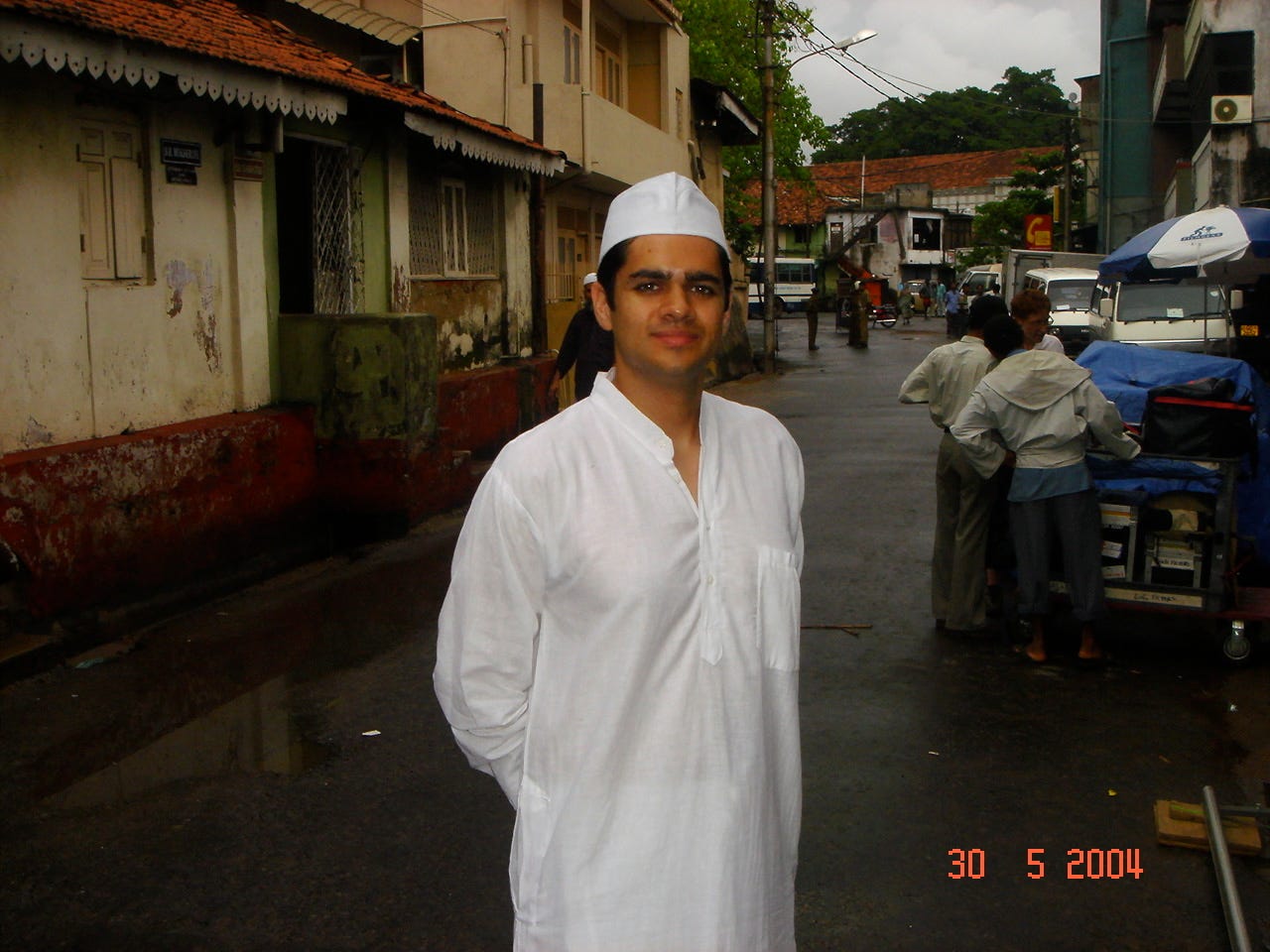Yet Untitled 081 - The T.A.Z of a Film Festival
The powerful idea of the Temporary Autonomous Zone
Dearest Yet Untitler,
A filmmaker who I met at the MAMI film festival shared the concept of the Temporary Autonomous Zone with me. I did some research - it’s a loaded term, born out of an anarchist poet’s analysis of revolutionary times, about a certain shared state of mind that people experience during significant, impactful events in their lives.
Let me say right here that my usage and understanding of the term is not based on an extensive analysis of Hakim Bey’s book “Temporary Autonomous Zones”, but on what started simmering in my brain when Vera Egito, the maker of a wonderful film called The Battle or “A Batalha da Rua Maria Antonia”, shared the concept first in the Q&A after her film at the MAMI film festival, then over a plate of thatte idli I took her out for at Dakshinayin in Juhu. Here’s a trailer of Vera’s film:
Here’s what I gleaned from my conversation with Vera about her film and about TAZs: her amazing film consisted of 21 long takes depicting the ‘Battle of Maria Antônia’, an event that happened in 196,8 when
“…students from two neighbouring universities in the centre of São Paulo clashed in a battle which left one dead and many injured…the so-called 'Battle of Maria Antônia' drove Brazil deeper into a military dictatorship which is still controversial to this day.”
For those not from the film world, this means that the whole film essentially comprises of only 21 cuts. For the sake of perspective, I’d say the films and TV shows we watch cut from shot to shot, on average, every 10-15 seconds - that too if I was being very generous.
21 years of dictatorship in Brazil. 21 long takes in Egito’s film.
Vera’s creative choice allowed the audience to experience the siege of an education faculty by right-wing fascists as close to real time as possible. It was a real trip. It was visceral. Sexy. Memorable. It made me think that I’m mostly shortchanged by the cinema I watch, with the medium having so much more to give.
But it wasn’t the audience alone who was drawn palpably into the present by Vera’s film. Vera and her crew found themselves in a certain zone while filming. Vera expanded on this: she shot the film in 16mm film, i.e. NOT digital. Film stock is limited - you only have a certain amount to shoot with. As a result, the filmmaking process was a lot more concentrated that what is, sometimes, the experience in our digital times of seemingly unlimited hard drive space. There was rigour. There was focus.
Vera reported that - in such circumstances - she and her crew began to experience the siege they were filming as if they were somewhat part of a revolution themselves - a part of something bigger than themselves; a palpable feeling that they were all looking in the same direction; feeling the same feeling that they could all recognise in each other.
I found all this very interesting. I’ve just come off a film shoot, and I experienced it myself. There were bits we were filming when everyone felt like we were a part of something bigger.

You may remember, dear Yet Untitled, that I’ve written about ‘the Zone’ before. Things that I wrote in these older instalments are relevant to this discussion of TAZs, but encountering the concept of the TAZ itself, I feel, added to my understanding of what I - and others - have called “being in the zone”.
Interestingly, Hakim Bey was an OG newsletter-guy, using the medium of communiques and Zines to circulate his thoughts in the New York of the 1980s. I found an interview where he talks about how TAZs have been accurately likened to dinner parties - where - with the right music, the right conversation and the right people, the gathering becomes memorable in unexplained ways. The simile works, because in such dinner parties, nobody prescribes what the conversation should be. Perhaps people bring different food, so the menu isn’t imposed; i.e ‘autonomous’.
Then everyone goes home; hence ‘temporary’.
It’s this temporary aspect which intrigued me and made me think.
Ol’ Leonard says again and again in my head:
There is a crack, a crack In everything That's where the light gets in.
I understand the TAZ as essentially a crack where everyone gets to function free of the usual structures that govern them. Functioning freely, we get to see the outlines of the structures themselves. Seeing the outlines, we can decide whether those structures are oppressive or not. On deciding, we can choose whether we want to function in accordance with those structures from thereon. Or not.
I have found Film Festivals to sometimes become amazing TAZs. This time, MAMI allowed me to isolate some of the structures that have been governing my filmmaking - conservatism, the algorithm followed by OTT platforms, fear. I watched Vera’s film and felt empowered to rebel, because the result of her rebellion was important.

Often, it’s because of the impact of one or more films at a festival that causes a mass of people to suddenly view the world differently and then talk to each other about why this is so. Vera’s film - and the experience of meeting her - suddenly made me view the world differently, along with a small group of folks who were feeling the same way after watching it along with me. I encountered some of them later at a restaurant, and felt a kinship with them - although no direct words were exchanged between us.
The film festival ends today, and with it - this crack closes in on itself. Tomorrow - Vera, I and the others who shared the experience of watching her film will be thrown by life deep into our own worlds again; and this communion will become a memory.
However, I feel it will remain a significant memory. One that will inspire me in the future and influence the choices I make from hereon. A TAZ may be temporary in its existence, but I have a feeling that the TAZ of watching Vera’s film has already asked me to be the instrument that replicates it sometime in the future.
To say the least, it’s left me inspired.
I’m leaving you with a few things that deserve a mention in the context of TAZs.
Jacob Collier
I am truly in awe of the magnitude of talent and humanity housed in this one young life. I was truly fortunate to watch him perform at the NMACC in Mumbai a few days ago.
During the performance, I believe that Collier created a TAZ. He didn’t just play the songs, he asked the audience to participate. He has an amazing superpower - a manner that so endearing, inclusive and easy - that you are happy to become his instruments whether you have musical talent or not.
See him do this with an audience in Lisbon:
Collier did the same with us. He gave us a task and showed us that we could complete it successfully - that we could unite in song successfully. Unite. Successfully. Us. A country where deep divisions deepen by a day. He showed us that a different set of rules could operate. Temporarily.
Because then the concert ended and we all went home.
Man on Wire
I’ve written about the very significant impact of this documentary on my life in two previous edition of YU (links below):
https://vasant.substack.com/p/yet-untitled-004
https://vasant.substack.com/p/yet-untitled-020-stage-fright
Philippe Petit, I think created a TAZ in NYC in 1974. Repeating myself a bit here, but see the impact that Petit had on those watching when he successfully walked a tightrope between the twin towers:
Essentially, everyone who saw Petit accomplish this tremendous act of bravery was changed forever. In the context of the TAZ, even thought the moment was temporary, its imprint had far greater reach and longevity. I wan’t there. I wasn’t even born. But here I am, talking about it to you in 2023, with my skin erupting in gooseflesh.
To my eyes, Petit caused a disruption that brought New York - that confluence of so many modern physical and social structures - to a halt and had a mass of humanity reflect on the fact that they themselves - human beings - were bigger than the society they had created.
His disruption which caused the New Yorkers who were present to experience things differently, was temporary - he was hauled off to jail right after he reached the other side. But its impact was not temporary. Neither, I feel, was Vera’s impact on the MAMI audience. Or Collier’s impact on Mumbai.
Ikeda and Gandhi
I feel truly patriotic when I think of my country as the country of Gandhi. In the context of TAZs, I think Gandhi created a moment in history quite akin to a TAZ - a temporary disruption in history’s continuum. Like Petit on his wire above New York, he showed, demonstrated, to the world that a different response to the violence of imperialism was not only possible, but it could succeed as a force to counter violence. It was a time of thinking differently, and a WIDE spectrum of the population transcending class and caste felt themselves looking in the same direction.

Ideas are powerful things. As Buddhist philosopher Daisaku Ikeda says in the context of Gandhi:
A great human revolution in just a single individual will help achieve a change in the destiny of a nation and, further, will enable a change in the destiny of all humankind.
I find it apt that Ikeda calls Gandhi’s disruption an act of ‘Human Revolution’, implying that a powerful idea has to manifest via a human being first before it can cause an impact.
I look at the present and miss Gandhi in times that I find painfully bereft of his sentiment. But…
An idea is a powerful thing.
I am drawn to conclude that when we act under the influence of a powerful idea, the impact too is powerful and significant. I think it works the other way round too. When we participate in destructive ideas, the impact that follows can be destructive, dividing and detrimental.
Nothing like a good, inspiring TAZ to counter this sense of doom! I vouch for the TAZs of MAMI, Vera Egito, Philippe Petit, Jacob Collier and Gandhi. I search for the courage and the rigour to find ways to amplify them, to channel them.
I suddenly have more reasons to write, more reasons to make films.
May you and I soon find ourselves as a part of the same TAZ. May it become an indelible memory that we share!
Thanks for listening!
V
Before you go…
Have any of you experienced being part of a TAZ? Please share. If you respond as a comment, then all readers will be able to participate in the conversation. If you reply to this email, only I will be able to read.
Tell me. Tell us.
I sure want to know!



Wow. How profound. I want to say something profound in return but I can't, because you've said it! I definitely buy in to what you are calling the TAZ. I think it happens when like-minded people come together, or sharing an event or occasion.
As part of my therapy for fatigue I've been working with the autonomous nervous system. My therapist says that we co-regulate of others. And we do. For example, going to a Buddhist meeting lifts everyone because we co-regulate the feelings of Buddhahood and empowerment. TAZ is also karma and collective karma - the 8th consciousness. The karma to be at a film festival or to witness that man tightrope walking between the twin towers (which was insanely crazy and amazing!)
Sorry guys - those of you who received this via email got a not-cleaned up version that had some of my while-writing notes left behind. Apologies!